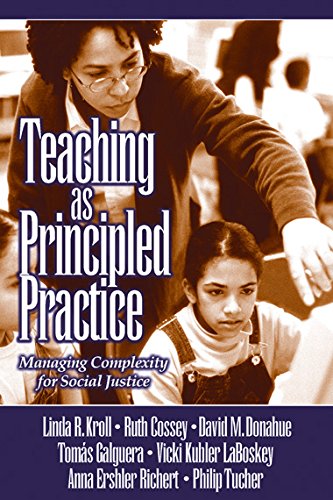Teaching as Principled Practice Managing Complexity for Social Justice
Linda R. Kroll, Ph.D. is a professor in the Department of Education at Mills College. She has taught at Mills since 1988 and served for two years as Dean and Chair of the department. She co-directs the Early Childhood portion of the Teachers for Tomorrow’s Schools program known as Developmental Perspectives in Teaching. Her research interests focus on applying developmental and constructivist theory to understanding and facilitating children’s and teachers’ learning. She has been a preschool teacher for emotionally disturbed children, and an elementary school teacher in Vallejo, California where she taught combined classes of kindergarteners through third graders for 9 years. She has been a teacher educator since 1979, where she helped found the UC Berkeley Developmental Teacher Education Program. Her work with children focused on urban settings with children with special needs, English Language Learners and children of color who are traditionally underserved. Her work with teachers has focused on urban school settings and in the Mills College Laboratory School. She is a contributing author to Reframing Teacher Education: Dimensions of a Constructivist Approach edited by Julie Rainer and to How Students Learn: Reforming Schools Through Learner-Centered Education edited by Lambert and McCombs. She is currently president of the Association for Constructivist Teaching. ... Read more Read less
This book is about a practical vision for effective teacher development for social justice and excellent outcomes for all children and youth, but especially those who have been traditionally underserved by the educational institutions of our country. This vision is encompassed in a set of six principles that underlie the work we do with pre-service teachers: the courses we teach, the supervision we do in the schools, the work we do with the cooperating teachers who open their classrooms to us and our students, and the ongoing conversations we have with our students and with one another. This book is about how one might teach using such underlying principles to guide one's practice. It speaks directly to pre-service and experienced teachers about a way to think about the challenges of urban education for teachers and children alike by building on a fundamental set of ideas. These notions are at the core of what and how we teach teachers and are at the core of how teachers can think about their own practice in schools. The principles are: teaching is inherently moral work, teaching is an act of inquiry and reflection, learning is a developmental constructivist process, the content of what we teach must be well understood by those who teach and those who learn, teaching is a collegial act, and teaching is political. Features and Benefits: } each chapter in the text addresses and explores one of the principles, presenting the rationale behind the principle and including several examples of how the principle informs the complicated work done in classrooms. } real-life case studies and voices of teachers show the application of each principle. } responses to each of the chapters/cases by school leaders examine the dilemmas of teachers from principled practice to the work of leadership. ... Read more Read less











